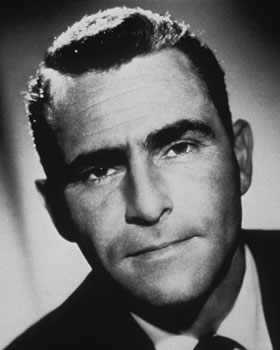
For a TV show that initially lasted only five seasons, it’s sure had an outsized impact on our entertainment and culture. To this day, if someone is referred to as “living in the Twilight Zone,” we know he’s really out there. In fact, the words aren’t even necessary—just hum four bars of the show’s theme, composed by Marius Constant, and your listeners will know exactly what you mean.
I was a regular viewer of “The Twilight Zone” when it originally aired from 1959 to 1964. Even though I was in grade school, my parents let me stay up late on Friday nights to watch it. Sometimes this wasn’t such a great idea for an 8 year-old—I can still remember how scared I was watching Kevin McCarthy molder away on his living room rug in “Long Live Walter Jameson,” after one of his ancient ex-wives shot him. And on a few occasions I just didn’t get the final twist, always the highlight of every TZ episode. I had no idea what the aerial shot of that globe and funny-looking tower meant at the end of “The Odyssey of Flight 33,” but I remember my mother exclaiming “They’re in 1939!” as she recognized the New York World’s Fair. But I loved the show. It was Adult TV, and it was fun to watch with the grown-ups (Now the pandered-to viewers are 18 and under, while the rest of us have to find our sanity on HBO or Showtime).
Some of the more famous “Twilight Zone” episodes are now overly familiar, like “Eye of the Beholder,” “Time Enough at Last,” “Nothing in the Dark” (with a gorgeous-beyond-belief Robert Redford) or “The Invaders”, but the majority hold up very well, at least as viewed on DVD (unfortunately the SyFy Channel marathons cut them to ribbons). One reservation: the hour-long episodes that aired during the show’s fourth season are not quite as good, in my opinion. TZ’s stock in trade was terse storytelling, ending with that final punch. “It’s a cookbook!” probably takes the prize in this category. “The Twilight Zone” was born for the half-hour slot it enjoyed for most of its run.
There are so many memorable TZ episodes that it’s difficult to come up with a list of favorites. I’m not particularly fond of Rod Serling’s moralistic stories, though I think “The Shelter” is still an interesting take on how ugly people can be in a life-threatening crisis. As a result my Top Twenty weighs more heavily on the side of fantasy, whether escapist or scary. In no particular order, they are:
“Walking Distance”—Gig Young in the performance of a lifetime, aided by Bernard Herrmann’s haunting score. You can’t go home again.
“A World of His Own”—Keenan Wynn makes Rod Serling disappear! “Why not leave well enough alone?” indeed.
“A Stop at Willoughby”—If I had to name my single favorite TZ episode, this would probably be it. A superb performance by James Daly, and not one word or scene wasted in telling the tale. Beautifully done.
“Long Live Walter Jameson”—If you live long enough, your past will do you in.
“It’s a Good Life”—That jack-in-the-box scared the bejesus out of me as a kid. Wish it into the cornfield, Anthony! With Cloris Leachman as his long-suffering mom.
“What You Need”—“Ah, but it’s what I need.” Just a terrific story.
“The Hunt”—Before he created “The Waltons,” Earl Hamner wrote a number of “Twilight Zone” episodes. This one, demonstrating that dogs are wiser than humans, is one of his best.
“The Odyssey of Flight 33”—I wonder if they ever made it all the way back?
“Nick of Time”—The dangers of trying to learn your future. That devil-head is pretty freaky.
“The Last Rites of Jeff Myrtlebank”—A very young and handsome James Best returns to life, somewhat changed.
“The Midnight Sun”—One of the few TZ episodes with a female protagonist. Lois Nettleton does a great job trying to stay cool.
“The Trouble With Templeton”—Brian Ahearne romanticizes the past. And it’s fun to see Sydney Pollack as a nasty director.
“Five Characters in Search of an Exit”—William Windom and Murray Matheson are among those trying to figure out the why and how.
“Stopover in a Quiet Town”—Barry Nelson and Nancy Malone make a great bickering couple who think it was only too much to drink the night before.
“Miniature”—A timid soul seeks escape from his awful family and the people around him. Robert Duvall is Boo Radley-otherworldly, and you cheer when he succeeds.
“Mr. Garrity and the Graves”—One of the few humorous TZ episodes that really nails it, due to a very dry John Dehner.
“Spur of the Moment”—Can you warn your younger self about the dangers to come? More importantly, will she even listen?
“The Long Morrow”—The most poignant twist ending of the series, thanks to Mariette Hartley.
“An Occurrence at Owl Creek Bridge”—I’m cheating a bit here, because this was actually an Oscar-winning independent short film that TZ aired during its last season. With the 1961 Civil War centenary, a number of TZ episodes were set during that conflict, as was “Owl Creek Bridge,” based on a short story by Ambrose Bierce.
and last but not least,
“Will the Real Martian Please Stand Up?”—Jack Elam (“It’s a regular Ray Bradbury!”), Barney Phillips and John Hoyt in a story of that extra passenger on the bus. The ending is classic:
What are your favorite episodes?

